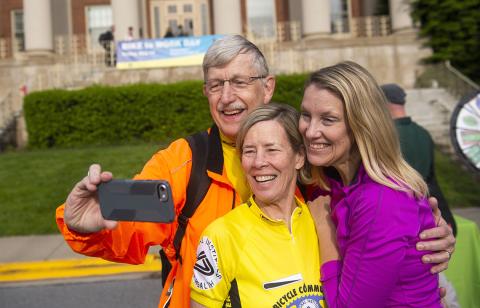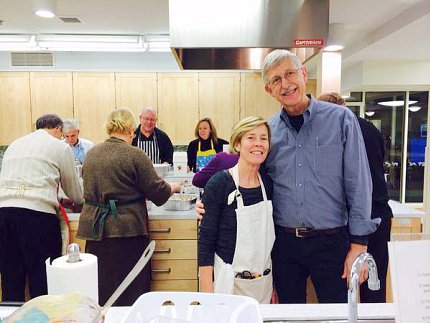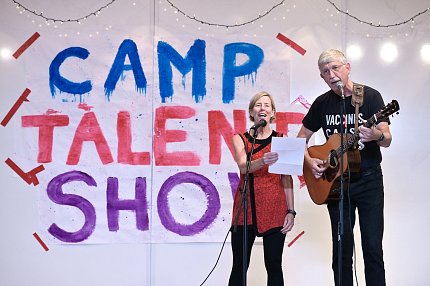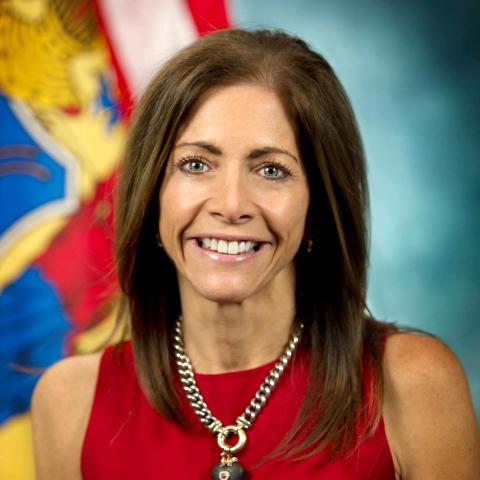‘Stand in Your Secret Power’
‘Activists Without Portfolios’ Baker, Murphy Speak

Photo: Lisa Helfert
Diane Baker has a checklist for herself: Do your job. Suit up. Stand in your secret power.
As the spouse of former NIH director Dr. Francis Collins, Baker has had a great deal of experience to hone her technique. A genetics counselor by training and previous director of the Graduate Program in Genetic Counseling at the University of Michigan, Baker found herself in a new role when Collins took the position of NIH director.
What does a spouse or partner do to support the NIH mission? Baker had to define that role for herself, and she shared her experience in the recent lecture “Activist Without Portfolio,” in the Empowerment of Under-Represented Researchers series hosted by the NIH Oxford-Cambridge Program (OxCam).
“I [didn’t] have credentials or accountability [for the job], but what I do bring to my role is simply who I am,” Baker said. Her background as a genetics counselor (and, before that, a person who had grown up in a very small Midwestern town) did not lend itself in any obvious way to a role as an NIH representative. It was “totally new terrain,” she recalled. However, she soon came up with a checklist that would help her succeed no matter the situation.
Her “do your job” tenet means just that. By considering her attendance at events as a job, she could be her best professional self. “Suiting up” doesn’t just mean an outfit (although comfortable shoes are a must for Baker); to her, it means bringing “flexibility, humor, empathy and curiosity” to every situation.
Baker’s next bullet point is “stand in your secret power.” She asked viewers to think about their accomplishments or things they most want people to know and to consider “what’s behind it?” Qualities such as hard work, perseverance, integrity and discipline are, she said, “[a] set of secret powers that you’re going to stand in.” One can use those unique skills and attributes to find common ground with others and start meaningful conversations.
Baker found that “curiosity was often [her] biggest asset,” and used that natural inquisitiveness to network at social functions. She was Collins’s plus-one for many events, and quickly had to learn to navigate these occasions on her own because her husband was often a speaker.
“My goal [was] to make this time matter,” she explained. “The reason you get invited back to things is not because you’re an expert, but because you’re more than an expert. You’re a person who contributes, who makes the environment rich, who engages others…you’re doing your work.”
She viewed her role as that of an ambassador for NIH. “As a spouse,” she explained, “you have a lot of opportunities to do goodwill and education.”

Baker was also very involved with on-campus activities, participating in events such as Take a Hike Day and Bike to Work Day and hosting prospective institute/center directors at her home with Collins. She found a niche at the Children’s Inn, serving on its board of directors but also taking on a more hands-on role with the patients and their families. She cooked dinners for them and took them on tours of D.C. She also served as a board member for the Friends of Patients at NIH, and volunteered with Camp Fantastic, a summer camp for NIH’s pediatric cancer patients.
Her endeavors both within and outside of NIH were driven by her own secret powers: her “intense curiosity about others” and her “desire for them to do the right thing,” she revealed. Baker firmly believes that everyone can find a secret power within themselves and use it to guide themselves to success.

Photo: Marleen Van Den Neste
“You have to really feel it in yourself,” she said, and that will let you know that you’re on the right track.
The lecture also featured Tammy Snyder Murphy, first lady of New Jersey. Described by others as “a force to be reckoned with,” she is another woman who uses her unique platform for good.
Murphy stepped into her role in 2018 when her husband, Phil Murphy, became governor of N.J. She had previously served in a variety of positions, from finance to nonprofits to representing the U.S. jointly with her husband in the Federal Republic of Germany.
As first lady, Murphy has “made the most of [her] ability to convene people across the state for the betterment of [N.J.].” She has championed many initiatives, such as tackling New Jersey’s infant and maternal health care crisis, incorporating climate change education into K-12 classrooms and jump-starting women-owned businesses.
Under Murphy’s leadership, her state opened a chapter of Golden Seeds, which is an angel investor network that supports female entrepreneurs. Despite the N.J. chapter’s inauspicious timing (it opened in February 2020), it was still the most successful chapter in the U.S. in 2020.

Murphy also has a track record for climate change advocacy, and, thanks to her efforts, her state is now the first in the nation to incorporate climate change education across all K-12 learning standards.
Her third core initiative, Nurture NJ, took on her state’s infant and maternal health crisis. New Jersey ranks 47th out of 50 for states with the highest maternal mortality rate, and Black women and their babies are 7 and 3 times more likely to die than their White counterparts.
“There is a fundamental breakdown across sectors, and…all social determinants of health really impact outcomes,” Murphy explained, adding that institutionalized racism lies at its core. Her strategic plan aims to reduce the state’s maternal mortality rate by 50 percent over 5 years and tackle the health inequities that contribute to this disparity.
Like Baker, Murphy emphasized the importance of building connections with others. “Draw upon the relationships you have built, as [they are] one of the most important resources anyone can access,” she advised. “Working together, we truly can do anything.”
The archived lecture can be viewed at: https://videocast.nih.gov/watch=44998.
For more information on OxCam, visit: https://oxcam.gpp.nih.gov/.
